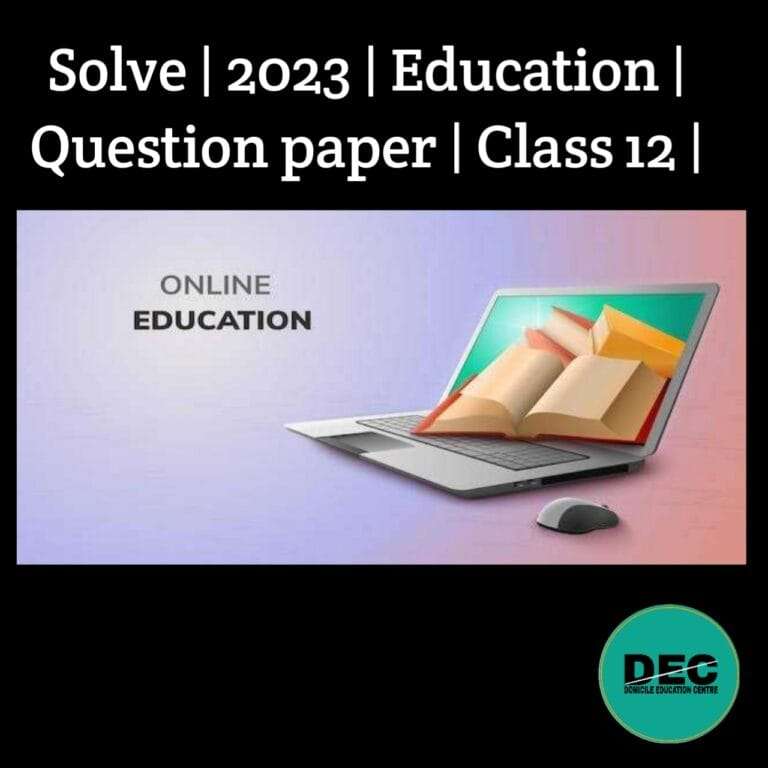2023
EDUCATION
marks: 100
Pass marks: 30
Time: Three hours
The figures in the margin indicate full marks for the questions.
- No. 1 carries 1 marks each …………………. 1 x 12 = 12
- No. 2 carries 2 marks each …………………. 2 x 12 = 24
- No. 3 carries 4 marks each …………………. 4 x 10 = 40
- No. 4 carries 6 marks each …………………. 6 x 4 = 24
Total = 100
1. Answer the following questions: (any twelve) 1x 12 = 12
Fill in the Blanks:
(a) On the basis of the recommendations of ____________ Commission Government of Assam constituted ‘Assam Higher Secondary Education Council’ in 1984.
Ans: Kothari Commission 1964-66.
(b) The word ‘Environment’ has been derived from the French word ____________ .
Ans: Environer
(c) German philosopher Friedrich Nietzsche used the word ‘values’ for the first in ___________ .
Ans: 1880
(d) A student could solve a sum by himself through repeated attempts such learning is supported by ___________ method of learning.
Ans: Observation
(e) According to Gestalt Psychologist, learning is an intellectual activity that involves the power of ____________ , perception and insight of the learner.
Ans: Trial and Error method
(f) Stimulus has strong influence on _____________ attention.
Ans: Voluntary
Give Short Answer in one sentence :
(g) In which year the Government of India adopted ‘National Policy for the Empowerment of Women’ ?
Ans: In 2001
(h) What is sensory memory ?
Ans: The memory that we get from immediate sensory experiences is known as sensory memory. For example: A driving Car.
(i) What is retro-active inhibition ?
Ans: When newly learned information makes people forget old information is known as retro-active inhibition.
(j) What s Mode ?
Ans: The number of scores that occurs in the list several times which is known as Mode.
(k) Where did the first open school start in India ?
Ans: Noida, India / Uttar Pradesh
(l) Seven students appeared in a test of mathematics. Eight students failed in the test. The marks of the successful students wee- 44, 32, 65, 72, 78, 80, 38, 50 and 54. Calculate the median considering the marks of all students.
Ans: Let check chapter 7 in details.
(m) Write the formula for finding out mode from frequency distribution table.
Ans: the formula for finding out mode from frequency distribution table is –
Mode= 3 Median – 2 Mean
(n) What is voluntary or volitional attention.
Ans: When an individual is physically and mentally ready to pay attention and he does it out of his own will, is called Voluntary or Volitional attention.
(o) Who was the propounder of Classical Conditioning Theory of learning ?
Ans: Ivan Pavlov
2. Answer any twelve of the following questions : 2x 12 = 24
(a) Write two suggestions given by ‘Secondary Education Commission’ for development of personality of the students.
Ans: The two suggestions given by ‘Secondary Education Commission’ for development of personality of the students are:
(i) Man is a social animal, So he should have the spirit of cooperation, discipline, humility, love, kindness and the feeling of brotherhood.
(ii) For the development of personality, the curriculum must have the subjects like – science, literature, fine arts, humanities, music and dace which inculcate these virtues in students.
(b) Write two importance of vocationalisation of Secondary Education in India.
Ans: The two importance of vocationalization of secondary education are mention below:
i. It can solve the socio-economic problems including the problem of unemployment in the youths.
ii. It helps the state in making effective use of man power resources for country’s development.
(c) Write two merits of correspondence education.
Ans: The two merits of correspondence education are mentioned below:
i. It helps to reduce the pressure on the formal education.
ii. It also helps to fulfil the aspirations of the persons who were working and wish to enhance their qualification.
(d) Write two objectives of Environmental Education.
Ans: The two objectives of Environmental Education are mention below:
i. Awareness:
To develop an awareness of environment sensitivity (feeling and attitudes) to the total environment and its allied problems.
ii. Knowledge:
To help in acquiring knowledge and variety of experience of the environment and associated problems.
(e) Define the concept of women empowerment.
Ans: Women Empowerment refers to the process of providing power to women who have been suffering from various disabilities, inequalities and gender discrimination to become free from the control of others, to assume power to control her own life and to determine her own conditions is called Women Empowerment.
Archives
(f) Write the theory of connectionism in learning.
Ans:
(g) Mention any two stages involved in the process of memory.
Ans: The two stages involved in the process of memory are:
i. Learning or acquisition of Experience:
Memory can not occur without prior learning or acquisition of knowledge. One must have sensation and perception of objects, acquire knowledge and experience in order to recall them in future. So that, this is the first and most essential stage of memory.
ii. Retention or Retaining:
Memory depends to a great extend on retention. After a thing is learnt it is retained in the mind. The retentive power of different individual remain different. Without this retaining function, nobody can have memory. So that this is the second important stage in the process of memory.
(h) Write two objectives of mental hygiene.
Ans: The two objectives of Mental hygiene are mentioned below in the following ways:
i. To develop healthy human relationship and group interaction between personality development and life experiences.
ii. To prevention and improvement of the mental health of the individual and the group.
(i) Find the mean and mode from the following data:
52, 48, 30, 62, 58, 42, 38, 50
Ans: Let check chapter 7 in details.
(j) Write two merits of Mean as a measure of central tendency.
Ans: The two merits of Mean as a measure of central tendency are:
i. The Mean is rigid which is a quality of a good measure of central tendency.
ii. It is not only easy to understand but also very easy to calculate.
(k) Write two demerits of Median.
Ans: The two demerits of Median are:
(i) In ungrouped data, the arranging scores of the data in ascending or descending order of magnitude is time consuming in case of a large number of observations.
(ii)It is a positional average which does not consider the magnitude of all the items.
(l) “Forgetting is necessary for memory” – Give reasons.
Ans: It is true that forgetting is necessary for memory because we know that retentive capacity, which is so essential for memory of an individual and it is an inherited ability and hence it is limited. That is, why forgetting helps mind to push necessary and old ideas into unconsciousness and thus made space to learn and retain new experiences. Therefore, we can say that forgetting is necessary for memory.
(m) Mention two difference between maturation and learning.
Ans: The two difference between Maturation and Learning are mentioned below:
(i) Learning is a result of Environmental Stimulus. On the other hand, Maturation is biological in nature.
(ii) Maturation occurs due to neural and muscular development. On the other hand, Learning takes place through practice and experience.
(n) Write two objectives of Non-formal Education.
Ans: The two objectives of Non-formal Education are mentioned below:
i. To promote awareness for literacy programme for national and individual development.
ii. To establish national infrastructure needs and provide for manpower requirement.
(o) Write two principles of Environmental Education.
Ans: The two principles of Environmental Education are:
i. To help social groups and individuals so as to get an awareness and sensitivity to the total environment and its allied problems.
ii. To helps social groups and individuals so as to gain a variety of experiences in and get a basis understanding of the environment and its associated problems.
(p) What do you mean by value education ?
Ans: Value Education refers to the form of education that covers all aspects of personality development which endeavours the values of moral, aesthetic, intellectual, social and spiritual development for the good of the society and the individual life is called Value Education.
Related Post Just Click Here: Solve 2024 Education Question Paper Class-12
Calendar of Content List:
| M | T | W | T | F | S | S |
|---|---|---|---|---|---|---|
| 1 | ||||||
| 2 | 3 | 4 | 5 | 6 | 7 | 8 |
| 9 | 10 | 11 | 12 | 13 | 14 | 15 |
| 16 | 17 | 18 | 19 | 20 | 21 | 22 |
| 23 | 24 | 25 | 26 | 27 | 28 | |


Recent Comments